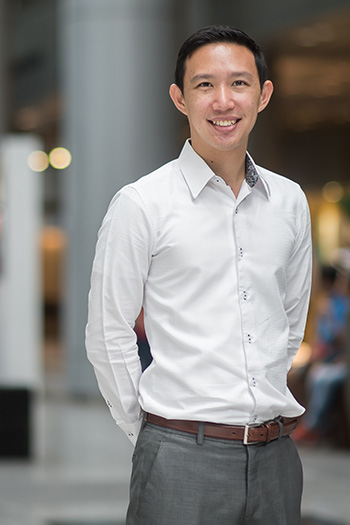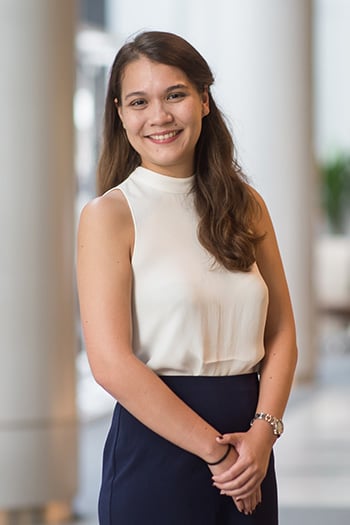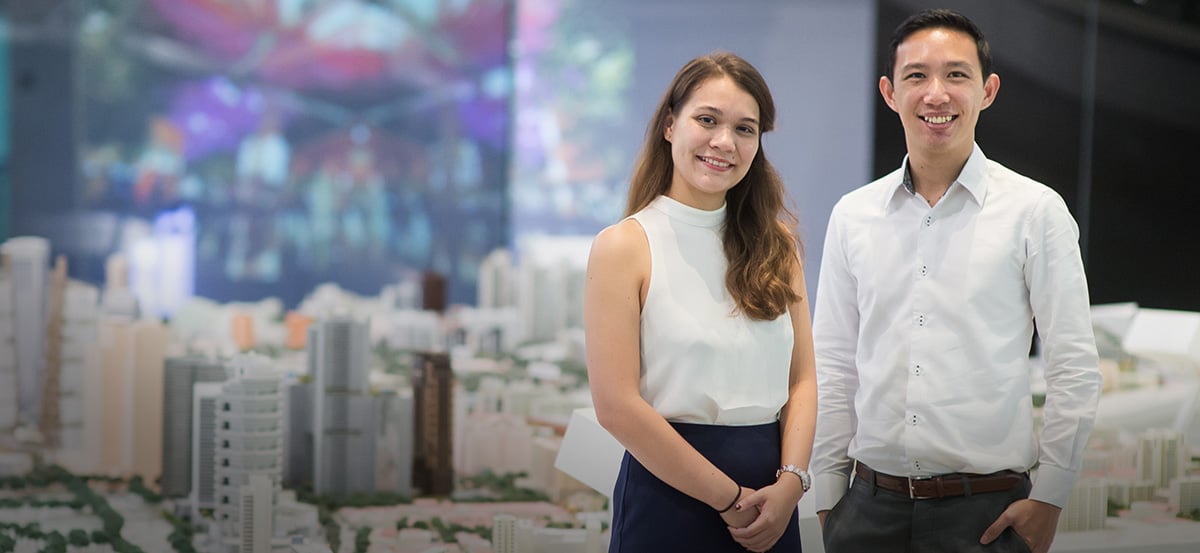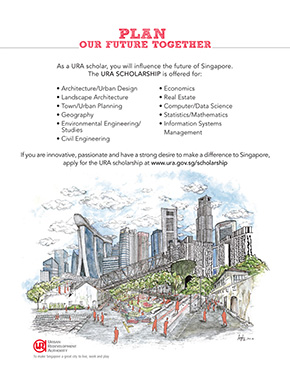Singapore is a small city state, and our land area has to support the entire spectrum of activities in not just a city, but also a country, and the multiple, competing land needs. Beyond transport, housing, offices, shops and industries, land is also required for reservoirs and water catchment areas, as well as security needs. As Singapore’s land use planning and conservation authority, the Urban Redevelopment Authority (URA) plays a vital role in ensuring that we have sufficient land for sustainable growth and provide a high quality living environment for our people. Daniel and Nicole, both planners at URA, share what their dynamic roles entail and how they contribute to achieving the vision and mission of the organisation.
What sparked your interest in applying for a scholarship with URA?
Daniel: While I was studying environmental science at National University of Singapore (NUS), I attended the 2010 World Cities Summit, organised by the Centre for Liveable Cities and URA. One of the workshops was about improving the resilience of cities, including Singapore. The topic was on rain gardens - how they serve not only as green areas, but also prevent flooding, as compared to typical concrete drains. From this, my interest in city planning started to grow and it made me realise that planning for the city is something that excites me, which led me to apply for a scholarship with URA.
Nicole: I was interested in the built environment, economics and sustainable development, and wanted to find a role that encapsulated my interests. There was a lot of buzz on the international stage at that time about urbanisation, and how cities could be the solution to many environmental issues. I wanted to see how I could be involved with that, and the work that URA does was just what I was looking for.

Daniel Soh Zhong Ming
URA Scholarship (Local - Mid)
Urban Planner
Share with us the opportunities you had received as a URA scholar.
Daniel: During my local scholarship in NUS, I pursued a six-month exchange programme in Canada. Thinking back, I would not have had this amazing opportunity if I wasn’t a URA scholar, given the high cost of living there. One of the most memorable experiences was when I witnessed active citizenry in the confines of a town hall. There, town planners consulted the local community, comprising students, working adults and retired elderly, on their renewal plans. For me, it was exciting to see how the planners presented the various options they had come up with and how the community scrutinised each plan, questioning and challenging the planners on how they could be improved. This is the direction that Singapore is heading towards, and I believe what I had experienced will serve as a model for me when I participate in future citizen engagement sessions.
At URA, I was given the opportunity to join the policy unit in the Development Control department. My role has exposed me to a broad spectrum of policy-making, from institutional and residential, to industrial and commercial. One of the highlights was going on overseas study trips to learn from other cities on how they tackle issues similar to those that we face here in Singapore. I travelled to Tokyo to learn how they improve productivity by leveraging on technology, such as using vending machines, to address the issue of an aging workforce. In Seoul, I observed how they revitalised the city by creating pedestrianized infrastructure that also serve as communal gathering spaces.
Nicole: As an overseas scholar, I spent three years in the United Kingdom, and one year in the United States. During this period, I was exposed to a myriad of experiences, diversity and cultural exchange. Over the summer breaks, I did an internship at Fundacion Metropoli, an urban planning consultancy in Madrid, and attended two summer courses at the Columbia University in New York City. Both opportunities made a significant impact upon me, and deepened my understanding of planning, preservation and development trade-offs within a city.
Another memorable trip was to Mexico City for a capstone project during my Master’s programme. The project involved a rainwater harvesting social enterprise to improve the reliability of water access to disadvantaged parts of the city. Through this experience, I learnt how various problems compounded due to the lack of basic access. Working with the team and community was extremely fulfilling and taught me so much about these urban problems which many face today.

Nicole Rose Mah Gui Ping
URA Scholarship (Overseas)
Urban Planner
Elaborate more on your main roles and responsibilities. How do they contribute to the organisation’s objectives?
Daniel: In Development Control, we ensure developments are implemented according to the Master Plan, in collaboration with various stakeholders and government agencies. We strive to balance between safeguarding the community’s interests and facilitating business operations. As part of the policy unit, I ensure the policies that guide building development are relevant in the current context while minimising unnecessary disamenity to neighbouring residents.
My role also includes providing information on a portal called URA SPACE. For it to better serve building professionals, business operators and the public, we actively engage them to find out how we can enhance the portal to make information more easily accessible and online transactions effortless.
Nicole: In my first year in Strategic Planning, I have been involved in future studies, long-term land use planning and outreach. As part of the Concept Plan team, I look at our long-term industrial needs and relevant land use implications. The team works together to balance different land use requirements. This ensures that we plan in a holistic way that is aligned with broader island-wide strategies. To keep us on track, I also help to oversee specific indicators that monitor our macro planning objectives.
How can young urban planners effect change in this new landscape, Daniel?
Daniel: Young planners have diverse international experiences and worldview, which serves as a great springboard to generate new ideas for implementation in Singapore. Being more familiar with technology, young planners are also more adept at integrating data analytics and other new technologies in their work to deliver more effective outcomes.
Lastly Nicole, what advice do you have for those considering a scholarship with URA?
Nicole: Develop your beliefs and widen your perspectives by getting as much exposure as possible. Get as much experience as you can from different internships and activities. Lastly, stay in touch with local issues and think about what you can do to improve the city you’re living in.

